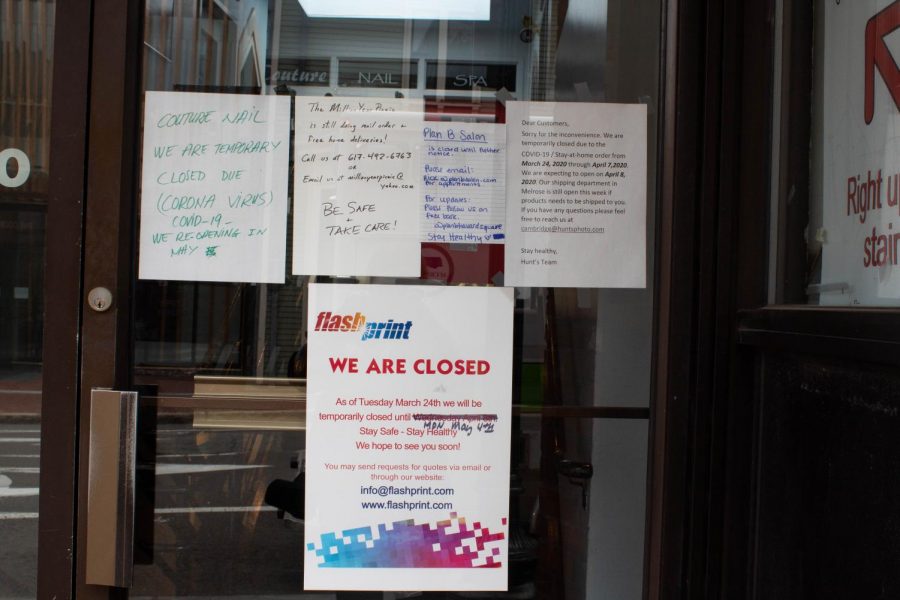Corporate Priorities: Massachusetts Workers Ask Whether Their Employers Care More About Them or Profits
Workers have criticized some multi-national corporations for putting profits over the health of their employees.
April 29, 2020
As citizens across the world shut themselves inside their homes to prevent the spread of COVID-19, workers at all levels are struggling with the decision between staying safe and paying their bills. At many large corporations, there have been concerns about disease transmission through contact with customers and co-workers. Employees from corporations such as Amazon, McDonald’s, and UPS have recently come forward to shed light on the reality of the environment in their workplaces and the general lack of care and attention that has been given towards employee health. One major complaint from workers has been about the honesty of the management in their company. One employee, who worked at SDF4, the name of an Amazon warehouse in Kentucky, told CNN, “We Amazon employees work hard every day, the least [the company] could do is be honest about the condition of things inside the belly of this beast.” What more, other employees have claimed that Amazon has not been following proper social-distancing procedures within their premises.
In a situation closer to Cambridge, UPS employees at a store in Chelmsford, Massachusetts have been raising concerns about the conditions they work in. So far, there have been three positive COVID-19 cases among their employees and many more who were put into quarantine. The employees’ union, Teamsters Local 25, has since expressed their dissatisfaction with the lack of resources available. According to the Boston Globe, the president of the union, Sean O’Brien, stated, “UPS has failed to clean and sanitize the trucks, equipment, and work areas on a daily basis. UPS is also refusing to provide critical information to its employees regarding positive and presumptive positive COVID-19 cases in the facility.” In response to these allegations, UPS representative Glenn Zaccara said that the company could not give information about confirmed employee cases due to privacy reasons, but they maintained that employee health was an important matter.”The company has provided ongoing support to employees to manage health risks,” Zaccara told the Boston Globe. “The health of our employees is essential for UPS to play the critical role it must now fulfill to keep the economy moving and our communities served.”
Even though many of these companies have significant resources, many employees can’t easily take paid sick leave. Just recently, during mid-March, there was legislation passed by the House of Representatives and President Trump involving COVID-19 and paid sick leaves. The purpose of this bill was to aid employees and provide financial relief by improving unemployment benefits. For the time being, workers are able to access two-thirds of their wages for almost 12 weeks in case of family issues pertaining to COVID-19. As for paid sick leaves, the maximum amount an individual can receive is $511 a day for self-care and $200 per day if they are caring for another person. The relief bill also supports public institutions like schools, hospitals, and nutritional assistance with government funding. However, there are multiple issues that counteract this legislation, as discussed by the New York Times: “Big employers like McDonald’s and Amazon are not required to provide any paid sick leave, while companies with fewer than 50 employees can seek hardship exemptions from the Trump administration.” This legislation does not apply to businesses with over 500 employees since those companies have the resources to provide their own paid sick leaves, rather than using US taxpayer money. Businesses with under 50 employees have the choice to file for exemption from giving paid sick leave if it interferes with their finances. While there are good intentions behind these clauses, it does allow for companies to become looser about their protocol regarding paid leave.
With the news circulating around the growing number of cases and issues with employee-company relations, students at CRLS have been forming their opinions about the matter. There are workers that are threatened by illness every day since they have face-to-face contact with customers, yet they don’t have the necessary means of protection. After hearing about the conditions of some workplaces, junior Nabeeha Samater commented, “These people work day in and out to provide consumers with services, but they don’t even have all the protective measures to be safe. It’s just unfair.” Another student, senior Lamisha Khan, an advocate for worker rights, has been vocal about her own opinions. When asked about her perspective on the situation, she said, “I think this just shows how our society looks down upon some essential workers and the government views their lives as expendable. The US is handling the pandemic and economic crisis terribly; I get that the government may be trying its best, but so many other countries have been handling it in different, but effective ways, so I wish we were more open to taking notes from other countries.” While the COVID-19 bill seems like a temporary solution to provide relief for employees, there is still a lot that needs to be done before there can be some order to this chaos. In the words of Khan, “All workers need to be protected, and the legislation isn’t doing that. I don’t think a one-time or even two-time check from the government is going to help things. We need to take care of the people who are the foundation of the economy, and just be better humans overall.”










